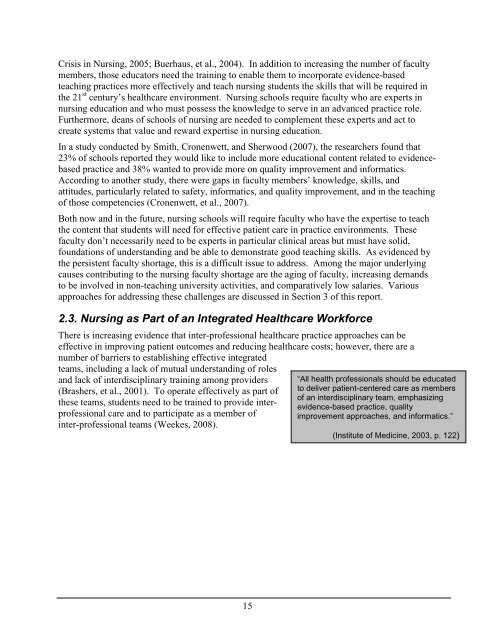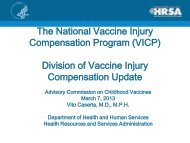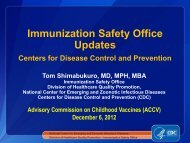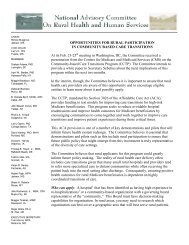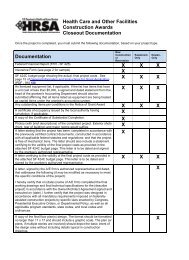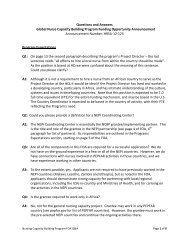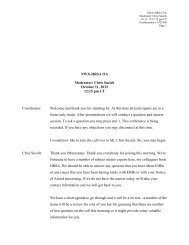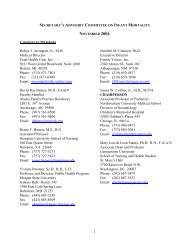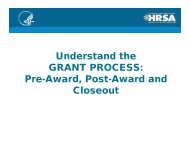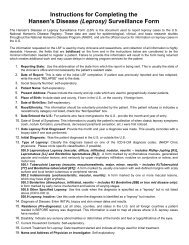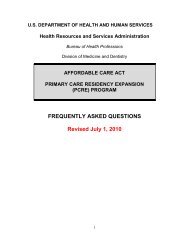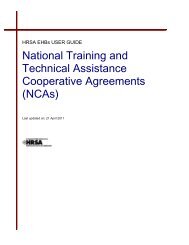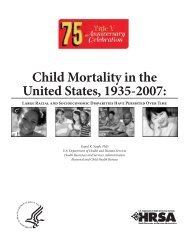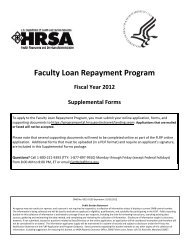Addressing New Challenges Facing Nursing Education ... - HRSA
Addressing New Challenges Facing Nursing Education ... - HRSA
Addressing New Challenges Facing Nursing Education ... - HRSA
You also want an ePaper? Increase the reach of your titles
YUMPU automatically turns print PDFs into web optimized ePapers that Google loves.
Crisis in <strong>Nursing</strong>, 2005; Buerhaus, et al., 2004). In addition to increasing the number of faculty<br />
members, those educators need the training to enable them to incorporate evidence-based<br />
teaching practices more effectively and teach nursing students the skills that will be required in<br />
the 21 st century’s healthcare environment. <strong>Nursing</strong> schools require faculty who are experts in<br />
nursing education and who must possess the knowledge to serve in an advanced practice role.<br />
Furthermore, deans of schools of nursing are needed to complement these experts and act to<br />
create systems that value and reward expertise in nursing education.<br />
In a study conducted by Smith, Cronenwett, and Sherwood (2007), the researchers found that<br />
23% of schools reported they would like to include more educational content related to evidencebased<br />
practice and 38% wanted to provide more on quality improvement and informatics.<br />
According to another study, there were gaps in faculty members’ knowledge, skills, and<br />
attitudes, particularly related to safety, informatics, and quality improvement, and in the teaching<br />
of those competencies (Cronenwett, et al., 2007).<br />
Both now and in the future, nursing schools will require faculty who have the expertise to teach<br />
the content that students will need for effective patient care in practice environments. These<br />
faculty don’t necessarily need to be experts in particular clinical areas but must have solid,<br />
foundations of understanding and be able to demonstrate good teaching skills. As evidenced by<br />
the persistent faculty shortage, this is a difficult issue to address. Among the major underlying<br />
causes contributing to the nursing faculty shortage are the aging of faculty, increasing demands<br />
to be involved in non-teaching university activities, and comparatively low salaries. Various<br />
approaches for addressing these challenges are discussed in Section 3 of this report.<br />
2.3. <strong>Nursing</strong> as Part of an Integrated Healthcare Workforce<br />
There is increasing evidence that inter-professional healthcare practice approaches can be<br />
effective in improving patient outcomes and reducing healthcare costs; however, there are a<br />
number of barriers to establishing effective integrated<br />
teams, including a lack of mutual understanding of roles<br />
and lack of interdisciplinary training among providers<br />
(Brashers, et al., 2001). To operate effectively as part of<br />
these teams, students need to be trained to provide interprofessional<br />
care and to participate as a member of<br />
inter-professional teams (Weekes, 2008).<br />
15<br />
“All health professionals should be educated<br />
to deliver patient-centered care as members<br />
of an interdisciplinary team, emphasizing<br />
evidence-based practice, quality<br />
improvement approaches, and informatics.”<br />
(Institute of Medicine, 2003, p. 122)


